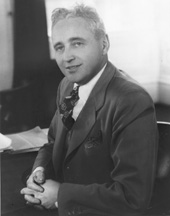Ernest W. Gibson, Jr.
| Ernest W. Gibson Jr. | |
|---|---|
 |
|
| Judge of the United States District Court for the District of Vermont | |
|
In office 1950–1969 |
|
| Appointed by | Harry S. Truman |
| Preceded by | James Patrick Leamy |
| Succeeded by | James L. Oakes |
| 67th Governor of Vermont | |
|
In office January 9, 1947 – January 16, 1950 |
|
| Lieutenant |
Lee E. Emerson Harold J. Arthur |
| Preceded by | Mortimer R. Proctor |
| Succeeded by | Harold J. Arthur |
|
United States Senator from Vermont |
|
|
In office June 24, 1940 – January 3, 1941 |
|
| Preceded by | Ernest Willard Gibson |
| Succeeded by | George D. Aiken |
| Personal details | |
| Born |
Ernest William Gibson Jr. March 6, 1901 Brattleboro, Vermont, U.S. |
| Died | November 4, 1969 (aged 68) Brattleboro, Vermont, U.S. |
| Political party | Republican |
| Spouse(s) | Dorothy P. Switzer Ann H. Haag |
| Alma mater |
Norwich University George Washington University Law School |
| Profession |
Lawyer Judge |
| Religion | Episcopalian |
| Military service | |
| Allegiance | |
| Service/branch |
|
| Rank |
|
| Unit | 43rd Infantry Division |
| Battles/wars | World War II |
| Awards |
Silver Star Legion of Merit Purple Heart |
Ernest William Gibson Jr. (March 6, 1901 – November 4, 1969) was the 67th Governor of Vermont, a United States Senator and a U.S. federal judge.
Gibson was born on March 6, 1901 in Brattleboro, Vermont, the son of Grace Fullerton Hadley and Vermont Senator Ernest Willard Gibson. He attended the public schools and graduated from Norwich University in 1923, where he was a member of the Alpha chapter of Theta Chi International Fraternity. He attended The George Washington University Law School and was admitted to the bar in 1926. While studying law he also taught at the New York Military Academy in Cornwall, New York and worked as a mathematician on the Coast and Geodetic Survey.
Gibson began practicing law in Brattleboro in 1927. A Republican, he was State's Attorney of Windham County from 1929 to 1933; assistant secretary of the Vermont State Senate from 1931 to 1933; and secretary from 1933 to 1940.
While serving on the Senate staff, Gibson was part of a network of acquaintances who were all lawyers, Republican party activists and National Guard members. In addition to Gibson, this group included: Leonard F. Wing; Harold J. Arthur; Murdock A. Campbell; and Francis William Billado.
...
Wikipedia
